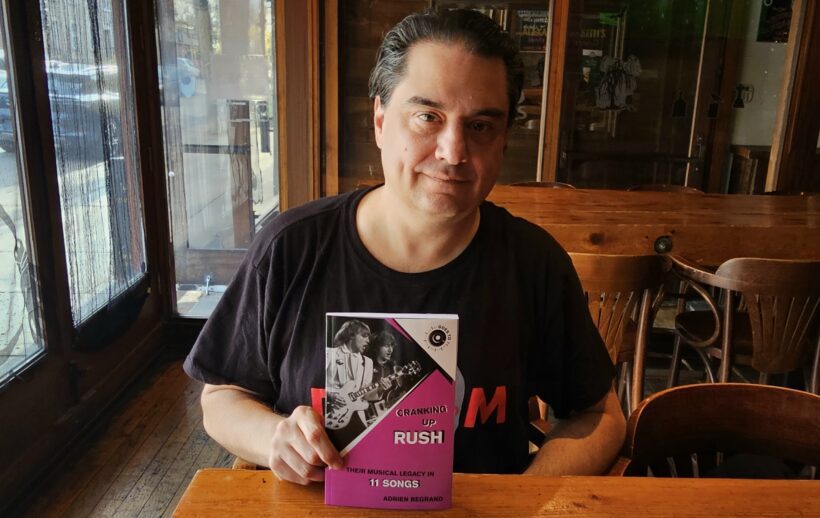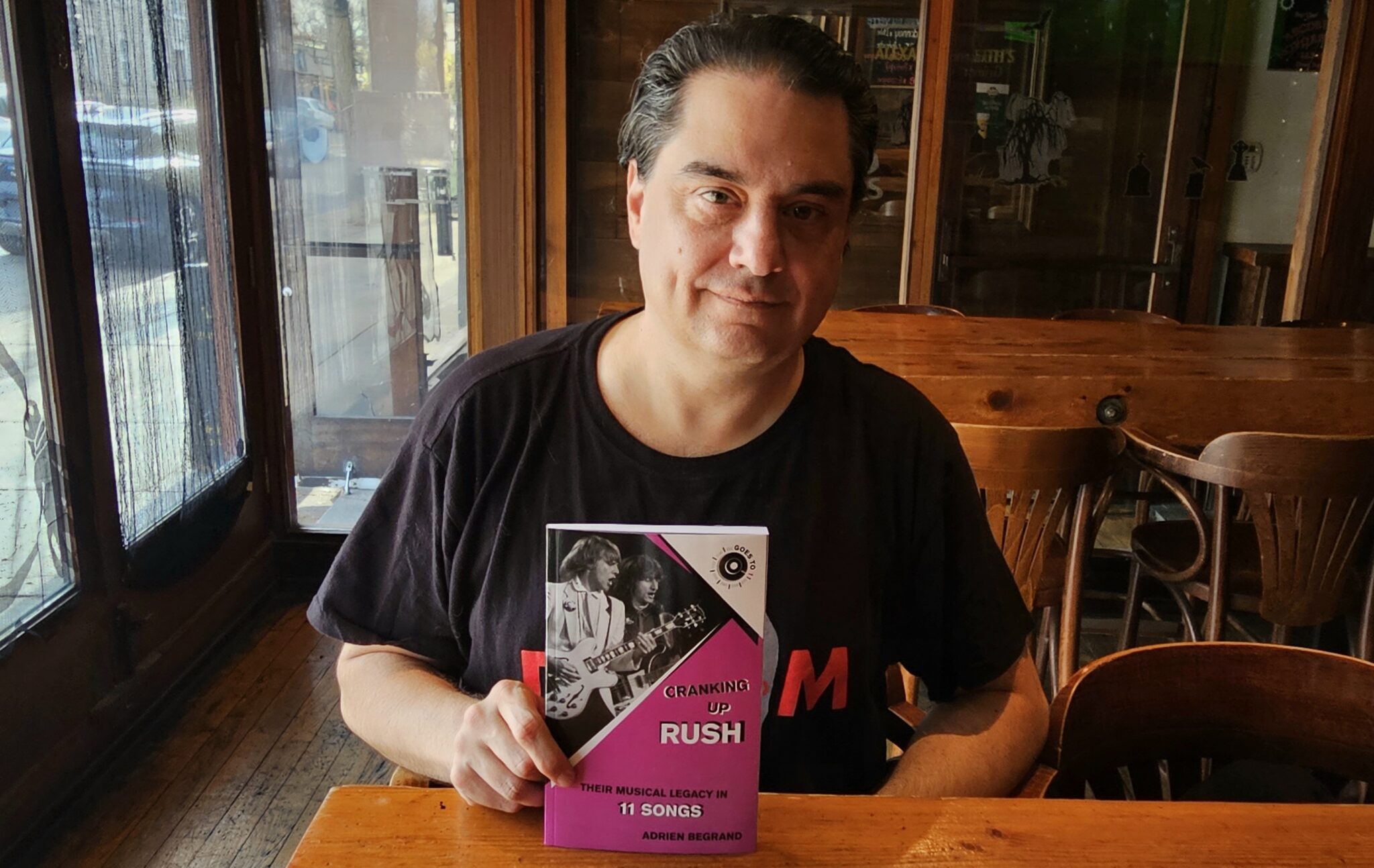
Adrien Begrand has been a staple at Decibel since he contributed his first piece to the magazine in January 2005, two decades ago. His work has appeared in virtually every other notable music publication and website throughout his writing career. Begrand is a sharp and insightful writer whose work is blissfully free of music writer cliches. He also has a deep knowledge and understanding of heavy music that dates back to his childhood in rural Canada. His writing makes readers better and more intelligent listeners.
In addition to his work as a journalist, Begrand is one of the world’s biggest Rush completists – one of the guys you’d see in a Rush documentary if he wasn’t writing about the band. Begrand’s two worlds connected this fall with the publication of his first book, Cranking Up Rush: Their Musical Legacy in 11 Songs, published by Backbeat. It’s a breezy and smart read, even if you aren’t a Rush completist. He talked to us about the project of a lifetime.
Where did the idea of the book come from? I know you’ve always been a huge Rush fan.
This was something I always knew I could do. You can relate – of all the bands we write about, some are easier to write about. We know the history, lore, and music, so it comes naturally. Rush has always been like that to me. While freelancing, I rediscovered Rush when Vapor Trails came out in 2001. They had just come off a late 90s period where they were dormant because Neil (Peart) lost a daughter and wife. I wasn’t crazy about Test for Echo, so I put my fandom aside and focused on other new music. Suddenly, they came back with Vapor Trails and sounded rejuvenated. They played in Rio and made a live album and DVD, reminding everyone how great they are. I then got to cover the rest of their career. I’ve written about 50 to 100,000 words about Rush outside the book.
I’m not a big Rush fan, although I appreciate their importance. The book’s introduction beautifully distills why people love Rush.
Every documentary I’ve seen about Rush doesn’t explain why they are appealing. They say you have to get it. That’s not a good enough answer for any newcomer. I tried to be honest and explain why this progressive hard rock band has a distinct appeal. It’s so multi-layered. Not only do you have the strength of the music, but there is humility to it. There is also a terrific sense of humor. The biggest thing about Rush is their constant curiosity. When they did their first album in 1974, it was indebted to Cream and Led Zeppelin. Their original drummer was frustrated that they moved away from the blues rock sound. Geddy (Lee) and Alex (Lifeson) needed someone to keep up with their ambition, so they had to find the right drummer. They have this constant willingness to learn.
Do you remember when you heard Rush the first time? Did it speak to you immediately?
I was born in 1970, so I should have discovered Rush when I was 10 years old in 1980. However, I lived in a remote part of Western Canada with minimal media access. We had two TV channels and AM radio. I missed out on almost everything. My family moved to a larger town in early 1983, and I started to experience the culture shock of MTV and FM radio. There was all this new pop culture to absorb. I saw the video for “Distant Early Warning” in 1984 – the first single from Grace Under Pressure. It was just so different. There was a seriousness to it. They weren’t singing about dragons or women. I found it very engaging, and the use of synthesizers was enticing. And the drummer and his gigantic kit were fascinating.
What was it about their music that was different from other things you’d heard?
Rush was just more cerebral. For a 13-year-old, it opened up a side of my music interests I wasn’t expecting. I was all about Twisted Sister, Iron Maiden, and Metallica, and Rush ignited this new curiosity. It just continued and fuels my love of new music to this day.
Rush has a vast catalog. What was your process for picking the 11 songs in this book?
Any list like this will ignite an argument. When asked to write the book, I came up with the idea in two minutes. Comparing different Rush eras is like comparing apples and oranges. How do you compare “Working Man” to “Subdivisions”? If I was going to explain the legacy, I needed to find a clever way to tell the Rush story. Rush is one of the only bands I know of that has a clear start and finish. Bands often continue making music until they are done or reunite every few years. Rush just ended. Their story is a definite arc, and they endured a lot of tragedy and success. They came to a beautiful conclusion on Clockwork Angels that wrapped everything up. I decided to go era by era and pick spots from that career arc.
Decibel usually doesn’t cover Rush. I’m wondering how Rush appeals to people into more extreme fare.
Rush informed Voivod, Tool, and many more from there. If you like progressive death metal, it owes everything to 70s Rush. Rush opened the doors to many cool ideas in heavy metal. They might not have been the first to combine progressive rock with the heavy metal sound, but they were the first to succeed at it. Rush bridged a gap between those who saw KISS and those who liked Yes. They combined progressive rock with metal and influenced Metallica, Queensryche, Trent Reznor, and more.
Rush also directly influenced the first generation of death metal musicians. If they wanted challenging music, they listened to Rush. If any death metal fans are skeptical, listen to something like “Anthem” or “Cygnus X-I,” and you will hear the blueprint for extreme metal. I think so, anyway (laughs).
You’ve been a music writer for decades. What did it feel like to have this accomplishment, especially since it’s about a band you love?
It’s the most rewarding work I’ve ever done. And it’s the easiest writing I’ve ever done. It was so simple. The only challenge was to bring context to the material, which involved a lot of research. I set aside a few Saturdays in 2023 at the kitchen table to write. The incredible thing is that much of the first draft is in the book. When I sent the first draft, they said it was already clean. It was such a rewarding time. Getting a book under your belt is something to be proud of. I always knew I had this in me.
When do you think Albert will put Shitfucker on the cover or in the Hall of Fame?
The longer time goes on, the more people will realize just how timeless, influential, and important Suck Cocks in Hell is (loud laughter).


